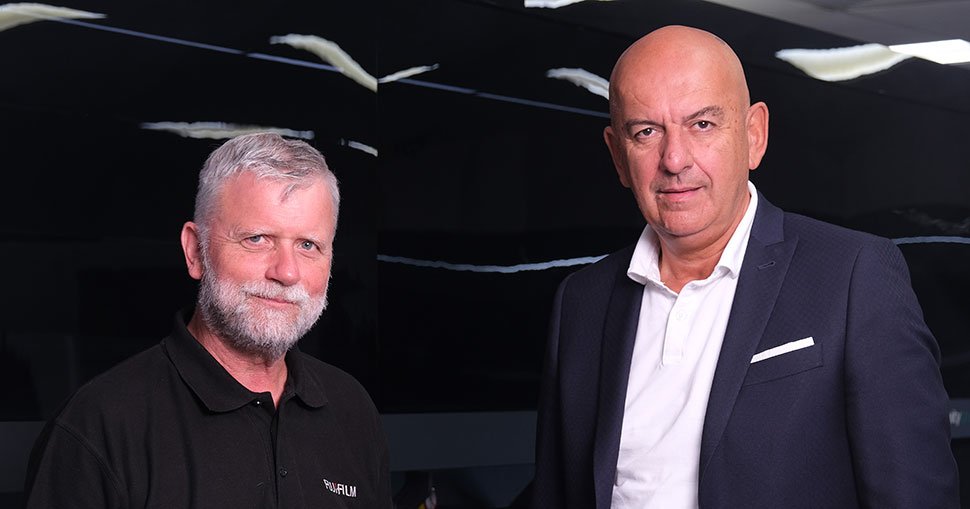“Think global, act local” is a mantra thought to have originated in the environmental movement in the 1970s, but it’s been widely adopted since then by business, and by global corporations in particular. It’s easy to see why.
Even if it’s the same products you’re selling, from place to place, the route to market will be very different. There’s the local language to consider, local sensibilities, local cultural norms and ways of doing business. Not to mention local economic considerations and concerns, and any number of different local agencies, dealers and distributors to build partnerships with.
This is how Fujifilm has always operated. My own role, and my own day-to-day working life, as WFIJ Dealer Manager for Fujifilm EMEA, is a constant reminder of this global/local approach.
I’m Irish, I live in France, and I work for a Japanese company – a company that has its European Corporate Headquarters in Germany, and its WFIJ Headquarters in the UK. I speak English, French, German and Italian, and my role takes me all over Europe, building and developing the relationships and partnerships that will give us the local knowledge and local access we need to bring our technology to as many different customers as possible.
In recent months, I’ve spent a lot of time in Italy, and the particular local challenges and opportunities in that market vividly illustrate just how important it is for global companies, like ours, to understand and to adapt to local market conditions wherever they go.
Market access
Sales success begins with a great product, and Fujifilm’s Acuity wide format range was completely re-engineered from the ground up, just a few years ago, in order to offer the best possible combination of speed, quality, reliability and value for money.
But, especially in a market like ours, a great product only gets you half way there. Reaching the right customers requires local knowledge and local partnerships. You need that local expertise to ensure that people, wherever they are, understand the benefits of your technology and you need to be able to tailor your offering to meet the very different challenges and priorities of every regional and national market.
This is perhaps even more true in Italy than in many other large European markets because, in Italy, it’s especially difficult to get national coverage through one or even a small number of dealer or distributor partnerships.
The market is much more regionally fragmented than others, making those relationships with dealers, distributors and independent agents, all the more important. This difference is likely, in part, because in Italy there remains a much greater proportion of smaller print-shops compared with elsewhere in Europe, and somewhat fewer, large print factories.
Brands with a new technological product, like us, need to prove not only the value of our technology, but also to demonstrate that we have a technology support network in place. How this operates can vary a lot depending on the partner, with some supplying their own engineers and others relying on brands to support their own machines. Understanding this eco-system, in a country like Italy especially, with its particularly complex market landscape, and taking full advantage of that local market knowledge and expertise, is vital.
Quattro Punto Zero: Tax breaks and subsidies
The regulatory environment is another key differentiator from market to market and, understanding how to take advantage of opportunities and navigate regulatory challenges is another important component of a ‘think local’ strategy. In Italy, print businesses (as well as many other industrial manufacturing companies) have taken advantage of the Industria 4.0 scheme. Known locally as “Quattro Punto Zero” this scheme is designed to encourage businesses to invest in technology that will support digital transformation and improve productivity and efficiency. The incentive was (at least until recently) a very strong one. If a company bought new technology that met the criteria of the programme, they were then able to claim a tax deduction of up to 40% of the value of the investment. There are costs to getting certified (€2,000 – €3,000) but it is a relatively straightforward process and these costs were dwarfed by the potential savings.
Regulatory environments though, particularly when it comes to tax incentives, are never simple, and they are rarely predictable. The Industria 4.0 scheme now offers a tax break of only half the size – at 20% – and Industria 5.0 has now also been introduced. This newer scheme is a more holistic programme in which, on top of meeting the ‘digital transformation’ criteria of the 4.0 scheme, new technology investments must also demonstrate that they are enhancing human wellbeing and providing additional environmental benefits.
There is a much higher cost barrier to entry for this scheme (certification costs around €10,000) but also much higher gains if successful – businesses who make investments that are Industria 5.0 certified can write off 45% of the investment against tax. From a wide format print perspective this makes the scheme potentially very interesting to those in the market for high end kit – but realistically not suitable for customers of mid-range products.
Being aware of these schemes, and keeping up with them as they are amended, developed, or replaced altogether, is vital, in order to effectively educate customers, and help them to understand what options might be available to them. Yet another reason that local knowledge and local partners are so crucial.
Investing in people
Backing up our ongoing investments in developing our technology – we’re also investing in the right people to roll that technology out in each market. We have an outstanding team of wide format print experts at Fujifilm Italy, both working directly with customers, and through multiple dealer partnerships – and that team has just received a massive injection of knowledge and experience: enter Gianluca Airaghi.
Fujifilm Italy’s newest recruit is one of the most experienced, knowledgeable and well-connected wide format sales professionals in the country. With a rich history of roles at leading companies in the digital printing sector, including Scitex Vision, HP, Elitron and Liyu, Gianluca enhances that crucial human link between our technology, and the people who stand to benefit from it. Whether working directly with customers, or with our growing network of partners, he provides enhanced local market knowledge and expertise to help to grow our wide format print market presence in Italy and bring the benefits of Fujifilm technology to an ever wider audience.
Think global, act local
And that brings us back to where we started. Fujifilm is a global tech giant investing millions in R&D annually, and continually innovating. But getting that technology in the hands of those who need it most is not a challenge that can be solved from a corporate boardroom. It calls for a local approach, more specifically, a personal local approach. The needs of a small, family run print shop in Naples will differ wildly from those of a highly automated print factory in Milan – as will the potential tax incentives on offer and the financing options available. Fujifilm has proven, award-winning, technology solutions for both business types, and all others in between – but it’s our local people, both Fujifilm employees and trusted partners, who make that vital, human connection, and ensure that businesses are paired with the right technology solution for their own very specific set of local challenges.

